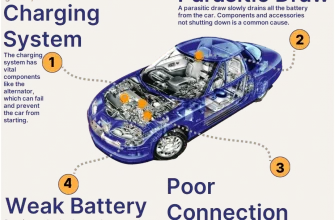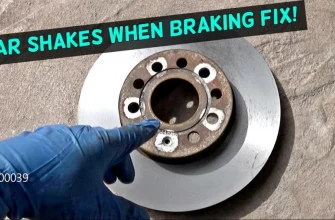Ah, the open road — the wind in your hair, the engine’s soft purr, and then suddenly, out of nowhere, a whistling noise fills the air․ If you’ve ever been jolted by a mysterious whistle emanating from your car, you’re not alone․ These sounds can range from annoying to worrisome, but understanding their origins can help you decode the mystery and address potential issues․ In this article, we’ll explore the common causes of car whistling noises and what you can do about them․
What Causes Car Whistling Noises?
Whistling noises in cars can stem from various sources, and pinpointing the exact cause can sometimes feel like solving a riddle․ Here are some of the most typical culprits:
- Wind Noise: Often, the simplest explanation is wind whistling through gaps or openings in your car․ This can happen if your windows aren’t fully closed or if there are issues with seals․
- Worn Out Seals: Over time, the rubber seals around your doors and windows can wear out or become damaged, leading to air leaks that produce whistling sounds․
- Brake Issues: If your brakes are worn down, they may begin to make a whistling noise when applied․ This could indicate that the brake pads are nearing the end of their life․
- Engine Problems: A whistling sound that increases with acceleration might signify a vacuum leak, which can affect engine performance․ This requires immediate attention from a mechanic․
- Loose or Damaged Components: Various components under the hood, like hoses or belts, can also emit whistling sounds if they are loose or damaged․
Diagnosing the Problem
When faced with a whistling noise, it’s essential to approach the diagnosis methodically․ Here’s how you can identify the source:
- Listen Carefully: Pay attention to when the noise occurs․ Does it happen when you accelerate, brake, or drive at a constant speed? This can provide clues about the source․
- Check the Windows and Doors: Ensure that windows and doors are fully closed and inspect the seals for any visible damage․
- Inspect the Brakes: If you hear a whistling noise while braking, it’s wise to check your brake pads for wear and tear․
- Consult a Professional: If you suspect engine issues or can’t determine the source of the noise, it’s best to consult a mechanic․ They have the tools and expertise to diagnose complex problems․
Preventive Measures
While some whistling noises may be unavoidable, there are steps you can take to minimize the risk:
- Regular Maintenance: Keeping up with your car’s maintenance schedule can help catch problems before they escalate․
- Inspect Seals: Regularly check the rubber seals around doors and windows for signs of wear․ Replacing these can prevent wind noise․
- Brake Checks: Have your brakes inspected regularly to ensure they are in good condition, which can prevent whistling sounds caused by wear․
Whistling noises from your car can be perplexing and sometimes alarming․ However, by understanding the potential causes and taking proactive measures, you can decode the mystery behind these sounds and keep your vehicle running smoothly․ Remember, if you’re ever in doubt, consulting a professional is always the best course of action․ After all, a little preventive care can go a long way in ensuring your car remains a source of joy rather than concern․
Exploring Solutions: What to Do When Your Car Whistles
Once you’ve identified the source of the whistling noise, the next step is to determine the best course of action․ Here’s a breakdown of potential solutions based on common causes:
1․ Wind Noise and Seals
If you suspect that the whistling noise is due to wind entering through unsealed gaps, start by inspecting the rubber seals around your car’s doors and windows․ Replace any that appear cracked or worn; A simple fix might involve applying weather stripping or silicone sealant to enhance the airtightness of your vehicle․
2․ Brake Noises
For whistling sounds that occur during braking, it’s crucial to have your brakes checked immediately․ Worn brake pads can lead to decreased stopping power, and ignoring this can lead to more severe issues․ A professional brake inspection will determine whether you need a simple pad replacement or if there are deeper issues at play․
3․ Vacuum Leaks
Should your car whistle during acceleration, a vacuum leak could be the culprit․ This requires a thorough inspection of the engine components, particularly the intake manifold and vacuum hoses․ A mechanic can utilize diagnostic tools to pinpoint the exact location of the leak and recommend necessary repairs․
4․ Loose Components
If loose parts are the issue, a comprehensive check under the hood might be necessary․ Components like air intake hoses, engine belts, or even loose screws can create whistling sounds․ Tightening or replacing these parts can often resolve the noise without extensive repairs․
When to Seek Professional Help
While some whistling noises may be minor inconveniences, others can indicate serious mechanical problems․ If the sound persists despite your efforts, or if you notice a change in your car’s performance, it’s time to consult a qualified mechanic․ Ignoring the signs could lead to more significant issues down the road, including costly repairs and safety hazards․
Your car is equipped with various signals and sounds that can help you gauge its health․ By staying attentive to whistling noises and understanding their potential causes, you empower yourself to take action before minor issues escalate into significant problems․ Remember, regular maintenance and timely interventions can not only ensure a smoother ride but also prolong the life of your vehicle․ So the next time you hear a whistle on your journey, take a moment to listen — it might just be your car trying to tell you something important․
In the grand tapestry of automotive care, communication is key․ Your vehicle speaks in different languages, and sometimes, all you need to do is decode its whispers to keep the engine of life running smoothly․










Such an enlightening piece! I found the section on worn-out seals particularly interesting. This has encouraged me to check my car more frequently!
I never realized how many factors could cause whistling sounds in my car. The tips for diagnosis are especially helpful. Great read!
What a useful article! The explanations are clear and concise, making it easy to understand what might be going on with my vehicle. Highly recommend!
I appreciate the detailed breakdown of potential issues leading to whistling noises. It’s comforting to know I can troubleshoot before visiting a mechanic.
This article provides a fantastic overview of car whistling noises! I learned so much about the possible causes and how to diagnose them. Very informative!